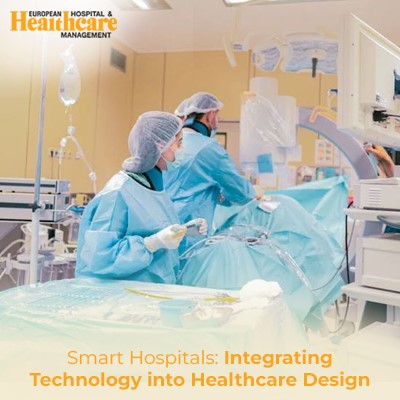Smart hospitals integrate advanced technologies like IoT, AI, big data, robotics, and telemedicine to enhance patient care and operational efficiency. Despite challenges like cost and data security, case studies from hospitals like Johns Hopkins and Cleveland Clinic demonstrate improved outcomes. Future trends include 5G, blockchain, advanced AI, and personalized medicine, shaping a healthier future.

In the modern era, healthcare is undergoing a revolutionary transformation, and at the forefront of this change are smart hospitals. These hospitals leverage advanced technologies to enhance patient care, streamline operations, and improve overall healthcare outcomes. This article explores how technology is being integrated into healthcare design, creating smarter, more efficient hospitals.
Smart hospitals are healthcare facilities that utilize interconnected technologies to improve patient care, operational efficiency, and clinical outcomes. These technologies include the Internet of Things (IoT), artificial intelligence (AI), big data, robotics, and telemedicine. By integrating these technologies, smart hospitals aim to create a seamless, patient-centered environment.
Internet of Things (IoT): IoT devices such as smart sensors monitor vital signs, track the location of medical equipment, and manage environmental conditions like temperature and humidity. Wearable health monitors track patients' health metrics in real-time, providing continuous data that can alert healthcare providers to potential issues before they become critical.
Artificial Intelligence (AI): AI algorithms analyze medical images and patient data to assist in diagnosing diseases more accurately and quickly than traditional methods. Predictive analytics helps doctors make informed decisions about treatment plans and resource allocation by predicting patient outcomes.
Big Data: Electronic Health Records (EHRs) store vast amounts of patient data, making it accessible to healthcare providers across different departments and facilities. Data analytics helps identify trends, improve patient outcomes, and streamline hospital operations.
Robotics: Robotics systems assist surgeons in performing precise, minimally invasive procedures, reducing recovery times and improving surgical outcomes. Robots handle routine tasks such as medication dispensing, cleaning, and transportation of supplies, allowing staff to focus on patient care.
Telemedicine: Telemedicine platforms enable patients to consult with healthcare providers remotely, increasing access to care, especially for those in rural or underserved areas. Patients with chronic conditions can be monitored at home, reducing the need for frequent hospital visits.
Improved Patient Care: Real-time data allows for personalized treatment plans tailored to individual patients' needs. Smart technologies reduce human error, ensuring that patients receive the right medication and treatment at the right time.
Operational Efficiency: IoT and AI optimize the use of hospital resources, such as staff, equipment, and facilities, reducing waste and lowering costs. Automating routine tasks streamlines hospital workflows, allowing healthcare providers to focus on patient care.
Better Clinical Outcomes: Continuous monitoring and predictive analytics enable early detection of health issues, leading to timely intervention and better patient outcomes. Integrated systems facilitate better communication and collaboration among healthcare providers, improving the quality of care.
Cost: The initial investment in smart technologies can be significant, making it challenging for some hospitals to adopt these innovations.
Data Security: Protecting patient data from cyber threats is crucial, as the increased connectivity in smart hospitals can make them vulnerable to attacks.
Staff Training: Healthcare providers need to be trained to use new technologies effectively, which can be time-consuming and costly.
Interoperability: Ensuring that different technologies and systems work seamlessly together is essential for the success of smart hospitals.
Johns Hopkins Hospital: Johns Hopkins integrates AI and robotics into their surgical procedures, improving precision and patient outcomes. Their EHR system is designed to facilitate easy access to patient data, enhancing coordination among healthcare providers.
Cleveland Clinic: Cleveland Clinic uses telemedicine to extend its reach to patients in remote areas. Their IoT-enabled patient rooms provide real-time monitoring, ensuring timely medical intervention.
Singapore General Hospital: Singapore General Hospital employs big data analytics to optimize resource allocation and predict patient admission rates. Their smart infrastructure includes automated guided vehicles (AGVs) for transporting supplies, reducing the workload on staff.
5G Connectivity: The rollout of 5G networks will enhance the speed and reliability of data transmission, enabling more advanced applications of IoT and telemedicine.
Blockchain Technology: Blockchain can provide secure, tamper-proof storage of patient data, addressing concerns about data security and privacy.
Advanced AI: Future AI systems will offer even more sophisticated diagnostic and predictive capabilities, further improving patient outcomes.
Personalized Medicine: Integrating genomics and AI will pave the way for personalized medicine, where treatments are tailored to individual genetic profiles.
Smart hospitals represent the future of healthcare, where technology and innovation come together to enhance patient care, improve operational efficiency, and achieve better clinical outcomes. While there are challenges to overcome, the benefits of integrating technology into healthcare design are immense. As technology continues to evolve, smart hospitals will play a crucial role in shaping a healthier, more efficient future for all.